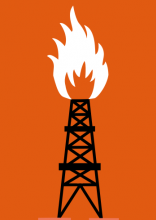Accueil > Articles divers & actualités > Fracking and the global land grab
Fracking and the global land grab
vendredi 8 février 2013
Fracking and the global land grab.
Pour ceux qui lisent l’anglais, voici le rapport que le TransNational Institute vient de publier sur les gaz et pétrole de schiste.
Le TransNational Institute est une organisation basée à Amsterdam qui travaille sur de nombreux sujets, qui est très bien intégrée à nombre de réseaux internationaux et qui est dotée d’une très grande légitimité ce qui signifie que la question des gaz et pétrole de schiste va un peu plus encore irriguer toute une série d’espaces associatifs internationaux.
Introduction

In recent years, land and water grabbing— the capturing of control of large areas of land and other associated resources like water and underground materials and most significantly of the power to decide on their use1 — has gained additional momentum. As vast tracts of land and water are converted into industrial food and non-food production and used for extracting mineral resources, their quality is being degraded en masse. Today a new type of land and water grab is underway, this time from unconventional gas extraction that puts communities at great risk especially of serious water diversion, depletion, and contamination.
This new threat is called ‘fracking’, the common term for hydraulic fracturing, a relatively new method for extracting unconventional gas. This trend, besides impeding the full advance of cleaner and sustainable energy solutions, is expanding corporate driven and profit-led control over natural resources. Fracking is increasingly being pushed as a key solution on national energy security agendas. This latest attempt (after agrofuels) to postpone ‘peak oil’ is likewise accompanied by a reckless corporate pursuit of profits through ever-more environmentally and socially harmful techniques.
This paper explains what is fracking, why and where it is happening today, who is promoting it and how ; providing a map of the global boom of fracking, its web of actors as well as the state of popular resistance. Promoted as a more sustainable energy source than other fossil fuels, fracking is spreading worldwide through a state-capital alliance that is capturing control of huge land and water resources at the expense of ordinary people. Fracking is an expression of the water and land grabbing agenda already underpinning expanding corporate takeover of natural resources. In addition to further intensifying and spreading fossil fuel extraction-related environmental destruction, fracking is breathing new life into the corporate oil industry, which is already a serious impediment to democratic control of resources and resource management and a key actor behind accelerating climate change. For all these reasons, fracking must be stopped.
Lire et/ou télécharger le rapport sur le site du TransNational Institute :
http://www.tni.org/briefing/fracking-and-global-land-grab
 Stop Gaz de Schiste - France - Ardèche
Stop Gaz de Schiste - France - Ardèche